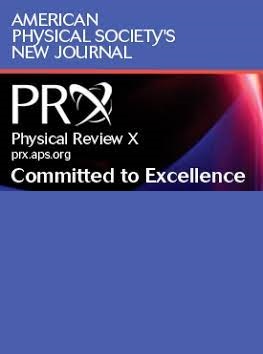Classification of Joint Quantum Measurements Based on Entanglement Cost of Localization
IF 15.7
1区 物理与天体物理
Q1 PHYSICS, MULTIDISCIPLINARY
引用次数: 0
Abstract
Despite their importance in quantum theory, joint quantum measurements remain poorly understood. An intriguing conceptual and practical question is whether joint quantum measurements on separated systems can be performed without bringing them together. Remarkably, by using shared entanglement, this can be achieved perfectly when disregarding the postmeasurement state. However, existing localization protocols typically require unbounded entanglement. In this work, we address the fundamental question: “Which joint measurements can be localized with a finite amount of entanglement?” We develop finite-resource versions of teleportation-based schemes and analytically classify all two-qubit measurements that can be localized in the first levels of the resulting hierarchies. These levels include several measurements with exceptional properties and symmetries, such as the Bell state measurement and the elegant joint measurement. This leads us to propose a systematic classification of joint measurements based on entanglement cost, which we argue directly connects with the complexity of implementing those measurements. We illustrate how to numerically explore higher levels and construct generalizations to higher dimensions and multipartite settings.基于局域纠缠代价的联合量子测量分类
尽管联合量子测量在量子理论中很重要,但人们对它们的理解仍然很少。一个有趣的概念和实际问题是,在分离系统上进行联合量子测量是否可以在不将它们聚集在一起的情况下进行。值得注意的是,通过使用共享纠缠,可以在忽略后测量状态的情况下完美地实现这一点。然而,现有的定位协议通常需要无界纠缠。在这项工作中,我们解决了一个基本问题:“哪些关节测量可以用有限的纠缠量进行定位?”我们开发了基于隐形传态方案的有限资源版本,并对所有可定位于所得层次结构的第一层的双量子位测量进行了分析分类。这些级别包括几种具有特殊属性和对称性的测量,例如贝尔状态测量和优雅的联合测量。这导致我们提出了一种基于纠缠成本的联合测量的系统分类,我们认为这与实现这些测量的复杂性直接相关。我们说明了如何在数值上探索更高的层次,并构造对更高维度和多部分设置的概括。2025年由美国物理学会出版
本文章由计算机程序翻译,如有差异,请以英文原文为准。
求助全文
约1分钟内获得全文
求助全文
来源期刊

Physical Review X
PHYSICS, MULTIDISCIPLINARY-
CiteScore
24.60
自引率
1.60%
发文量
197
审稿时长
3 months
期刊介绍:
Physical Review X (PRX) stands as an exclusively online, fully open-access journal, emphasizing innovation, quality, and enduring impact in the scientific content it disseminates. Devoted to showcasing a curated selection of papers from pure, applied, and interdisciplinary physics, PRX aims to feature work with the potential to shape current and future research while leaving a lasting and profound impact in their respective fields. Encompassing the entire spectrum of physics subject areas, PRX places a special focus on groundbreaking interdisciplinary research with broad-reaching influence.
 求助内容:
求助内容: 应助结果提醒方式:
应助结果提醒方式:


